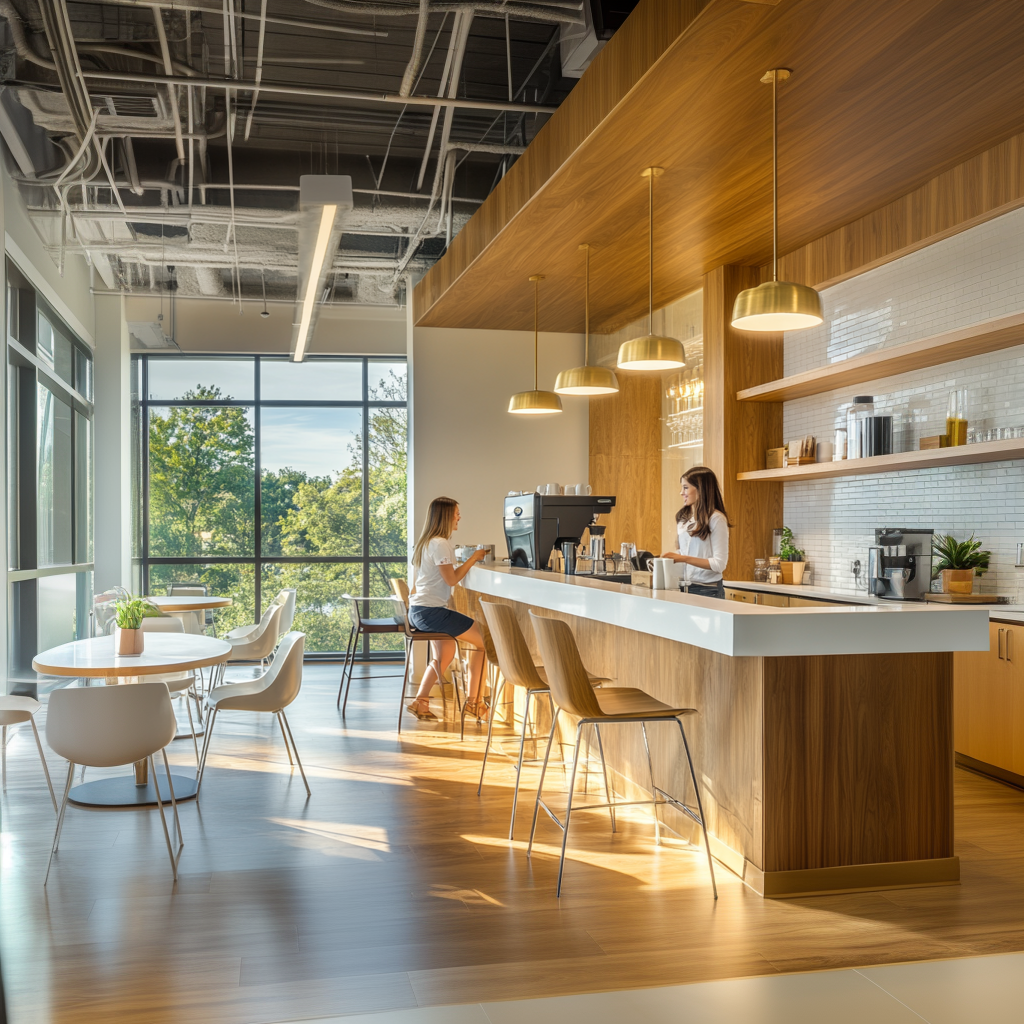What’s the Key to Increasing Productivity? It’s in Your Cup!
How many of us have coffee to start the workday? Coffee is more than just a morning ritual if you’re like the majority of people. It’s a necessity. What if we told you, however, that caffeine is more than just a personal boost? It’s a social bonding tool, stress reliever, and productivity hack that can change your workday.
Coffee might actually be your company’s most valuable player (MVP). It improves concentration, encourages innovation, and forges closer bonds within the team. Coffee can help you reach your full potential, whether you’re managing a Fortune 500 company or working on a startup project.
Let’s explore the intriguing ways that caffeine has influenced workplace culture and why a simple cup of coffee could be your secret success tool.
An Overview of Coffee’s Role in the Workplace
Coffee was fostering brilliant minds and significant movements long before it became the lifeblood of contemporary offices. According to legend, coffee was initially found in Ethiopia when Kaldi, a goat herder, noticed that his goats were becoming unusually active after consuming red berries from a specific plant. The rest is history, or more accurately, productivity in a cup, as those berries turned out to be coffee cherries.
Coffee arrived in Europe by the 17th century, and coffee shops began to appear in big cities like Vienna, Paris, and London. These were bustling centres of discussion, invention, and even revolution, not just spots to enjoy a hot beverage. Coffeehouses are often credited with helping to shape the Enlightenment, as thinkers congregated to discuss novel concepts over cups of “black gold.”
Coffee’s function has changed over time, moving from igniting philosophical discussions to facilitating morning meetings and project deadlines. There is such a strong correlation between coffee and productivity that some people even joke that caffeine and Wi-Fi power the modern office.
From Kaldi’s playful goats to the modern, slick espresso machines found in business break rooms, the humble cup of coffee has come a long way. However, one thing hasn’t changed: coffee continues to be the catalyst for ideas to spread.
Caffeine as a Tool to Improve Performance
Caffeine is the most effective productivity hack. Sometimes a cup of coffee is all you need to unlock peak performance, so forget about expensive time-management apps or bullet journals. And science supports it, so it’s not just folklore.
Caffeine is the most commonly used performance-enhancing drug worldwide, per Purdue University research. Actually, coffee is the most common source of caffeine, with up to 80% of American adults consuming it daily. Why? Because caffeine is effective. It increases dopamine and norepinephrine levels, which improve focus and alertness, and inhibits adenosine, a neurotransmitter that causes drowsiness.
The worst part is that you can experience the effects without a triple-shot espresso. According to studies, just 50 milligrams of caffeine, or roughly half a cup of regular coffee, can increase mental clarity and alertness. This explains why so many of us grab a cup of coffee before beginning a challenging task or enduring an extended meeting.
Caffeine can improve your critical thinking and decision-making abilities in addition to providing a rapid energy boost. This is especially crucial in high-stress settings where quick decisions have the power to make or ruin a project. Caffeine basically makes you think more quickly and intelligently, which is an invaluable skill in any professional situation.
The Undiscovered Power of Coffee: The Social Lubricant Effect
Consider coffee to be a one-man show for getting things done? Rethink your thought. Beyond its benefits for productivity, coffee has a special social superpower that is frequently disregarded: it unites people.
Phrases like “Let’s grab a coffee” have come to represent casual meetings, networking, and even job interviews for a reason. Coffee breaks have developed into brief opportunities for team-building, allowing coworkers to connect, talk, and share ideas outside of the official setting. Actually, rather than in stuffy boardrooms, some of the most productive brainstorming sessions take place over a casual cup of coffee.
Coffee’s capacity to dissolve barriers is what makes it so magical. Conversations feel more relaxed and less intimidating when one is holding a cup of coffee. Whether you’re an intern or a CEO, it’s a great equaliser. Sharing a cup of coffee fosters a sense of connection that is universally human and cannot be duplicated via Zoom calls or emails.
Consider Google. Coffee stations are positioned thoughtfully throughout the company’s offices to promote unplanned dialogues between staff members from various departments. These informal coffee conversations frequently lead to creative ideas that might not have come up in a formal setting.
The Business Case for High-Quality Coffee Provision
The difference between a poorly brewed cup of high-quality coffee and mediocre office coffee is enormous, let’s face it. You may be denying your staff a significant productivity boost if your office still uses a dusty drip machine and bulk-purchased coffee grounds.
Consider coffee as an investment in the productivity and welfare of your staff. Research indicates that when companies serve high-quality coffee, their staff members feel more engaged, appreciated, and energised. A small gesture can have a big impact.
In addition to productivity, there is the aspect of well-being. Coffee breaks are a natural way to decompress and rejuvenate. A well-designed coffee station demonstrates to staff that their comfort is important. Furthermore, let’s face it: contented workers who consume coffee are much more likely to approach large projects with zeal than their less-caffeinated counterparts.
Clients and guests also notice, in addition to staff members. Imagine arriving at a meeting and being served a freshly brewed cup of coffee rather than the typical, stale office brew. That minor detail might make a big impression and strengthen the hospitality and attention to detail that your business values.
Benefits like excellent coffee can be a subtle but effective differentiator in a cutthroat business environment. Therefore, improving your coffee game is one of the easiest — and most effective — things you can do to increase productivity, morale, and even brand perception.
Maximising the Benefits of Coffee Breaks
Taking a coffee break may seem like a straightforward routine: get a cup, take a sip, and then go back to your desk. However, with a little forethought, that break can turn into a potent tool for productivity and even a means of enhancing workplace wellbeing.
Plan your coffee breaks strategically. Schedule your coffee breaks to align with your natural energy dips rather than waiting until you hit a wall. In the middle of the morning and mid-afternoon, most people lose focus. Take advantage of those opportunities to put down your screen and have a cup of coffee to rejuvenate.
Make coffee breaks into opportunities for micro-networking. Never undervalue the impact of a quick conversation over coffee. Make the most of your coffee breaks by interacting with coworkers you might not normally see. Stronger working relationships, new ideas, and collaborations can result from these casual discussions.
Establish a joyful coffee ritual. Little rituals can have a significant impact at times. Find a rewarding coffee ritual, whether it involves grinding fresh beans, pouring the ideal brew, or just enjoying a quiet moment with your cup. This simple action can improve mindfulness, lower stress, and add enjoyment to your workday.
Take the buzz into balance. Although caffeine is an excellent tool, moderation is key. Burnout, anxiety, and jitters can result from consuming too much coffee. Maintain a schedule that gives you energy without going overboard. To stay hydrated and balanced throughout the day, think about switching up your coffee with herbal or decaf teas.
Here’s Why Coffee Is the True MVP
Coffee may appear to be just another beverage at first, but in the workplace it fosters culture, increases productivity, and connects people. Coffee justifies its place as a vital tool in any professional’s toolbox because it can inspire creativity and reduce stress.
Coffee not only powers your brain, but it also fosters relationships, teamwork, and dialogue. It is the unsung hero of late-afternoon slumps, team meetings, and deadline days.
Give a small nod of gratitude the next time you lift your mug. Because sometimes your cup, rather than a suit or a screen, is the highlight of your workday. Let’s toast to that!





